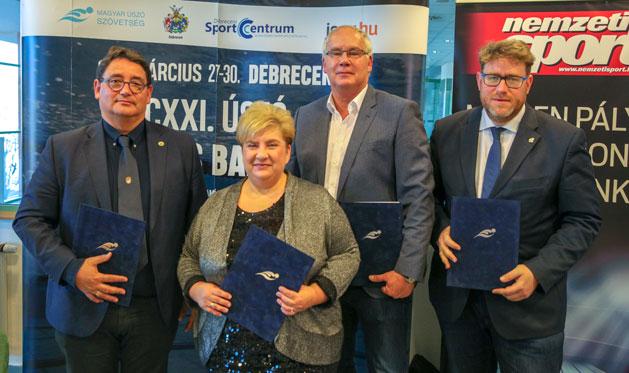The Hungarian Swimming Association (MÚSZ) and Semmelweis University have signed a cooperation agreement prior to the start of the national swimming championships in Debrecen. The goal is for the university to provide a complex health care background to the members of the Hungarian national team.
 The goal of the framework agreement concluded between Semmelweis University and MÚSZ is to provide a comprehensive, complex health care background to the members of the Hungarian national team, including treatments for acute and chronic illnesses covering all health care disciplines, as well as prevention and rehabilitation services, said rector Dr. Merkely Béla, the director of the Városmajor Heart and Vascular Center. In the case of swimmers, in addition to cardiological examinations, pulmonology is especially important, as are otorhinolaryngology (ear, nose and throat), gynecological and general internal medicine screenings, patient care and preventing the development of illnesses. Moreover, the agreement also extends to complex performance diagnostics, the first step of which is an extended sports cardiology screening test, and laboratory and on-track measurements in performance physiology every six weeks, in line with the phases of training. A total of 36 university clinics and departments are involved in the cooperation, the rector noted, emphasizing that in addition to prevention, the goal is to support a rapid recovery after injuries or illnesses.
The goal of the framework agreement concluded between Semmelweis University and MÚSZ is to provide a comprehensive, complex health care background to the members of the Hungarian national team, including treatments for acute and chronic illnesses covering all health care disciplines, as well as prevention and rehabilitation services, said rector Dr. Merkely Béla, the director of the Városmajor Heart and Vascular Center. In the case of swimmers, in addition to cardiological examinations, pulmonology is especially important, as are otorhinolaryngology (ear, nose and throat), gynecological and general internal medicine screenings, patient care and preventing the development of illnesses. Moreover, the agreement also extends to complex performance diagnostics, the first step of which is an extended sports cardiology screening test, and laboratory and on-track measurements in performance physiology every six weeks, in line with the phases of training. A total of 36 university clinics and departments are involved in the cooperation, the rector noted, emphasizing that in addition to prevention, the goal is to support a rapid recovery after injuries or illnesses.
Sándor Wladár, the president of MÚSZ, stressed that the expertise of the trainers and the necessary infrastructure is not enough, it is also necessary to have a scientific background, which will now be provided to Hungarian swimmers by Semmelweis University.
The Városmajor Heart and Vascular Center has been dealing with sports cardiology for 11 years. What focused attention on the importance of the cardiovascular stress performance of athletes was the death of Olympic gold medal-winning canoeist György Kolonics prior to the 2008 Beijing Olympics, after which it was decided that top professional athletes should go through systemic cardiac examinations. Following Kolonics’s tragic death, every Olympian was examined with the help of the Center, and by today the regular cardiac screening of athletes has become standard; it includes in every case a cardiac ultrasound examination, as well as cardiac CT and MR scans if certain risk factors are present. Detailed sports cardiology screenings can help prevent unexpected tragedies from happening both in Hungary and elsewhere.
In addition to Semmelweis University, the president of MÚSZ also signed cooperation agreements with the Hungarian Anti-Doping Group (MACS) and the sports daily Nemzeti Sport in Debrecen, prior to the start of the 121st Hungarian national swimming championships.
Eszter Keresztes, Pálma Dobozi
Translation: Tamás Deme
Photo source: Attila Török (Nemzeti Sport)


